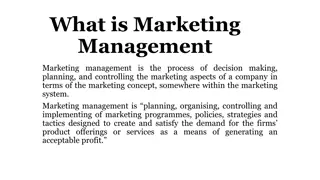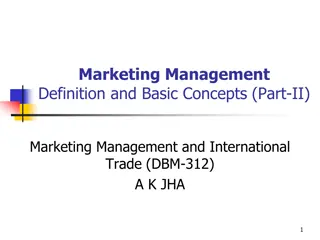The Nature of Marketing Management
Marketing management combines the fields of marketing and management, focusing on identifying consumer needs, creating products, setting prices, managing distribution, and promoting goods/services. It involves activities such as planning, organizing, staffing, directing, and controlling to achieve business objectives. Marketing is an economic function, legal process, and system of interacting business activities that serve to transfer ownership, interact with customers, and produce profit. It is a managerial function that aims to satisfy customer needs, generate profit, and build relationships within society.
Download Presentation

Please find below an Image/Link to download the presentation.
The content on the website is provided AS IS for your information and personal use only. It may not be sold, licensed, or shared on other websites without obtaining consent from the author.If you encounter any issues during the download, it is possible that the publisher has removed the file from their server.
You are allowed to download the files provided on this website for personal or commercial use, subject to the condition that they are used lawfully. All files are the property of their respective owners.
The content on the website is provided AS IS for your information and personal use only. It may not be sold, licensed, or shared on other websites without obtaining consent from the author.
E N D
Presentation Transcript
Nature of Marketing Management It Combines the Fields of Marketing and Management As the name implies, marketing management combines the fields of marketing and management. Marketing consists of discovering consumer needs and wants, creating the goods and services that meet those needs and wants; and pricing, promoting, and delivering those goods and services. Doing so requires attention to six major areas - markets, products, prices, places, promotion, and people. Management is getting things done through other people. Managers engage in five key activities - planning, organizing, staffing, directing, and controlling. Marketing management implies the integration of these concepts.
Marketing is an Economic Function Marketing embraces all the business activities involved in getting goods and services , from the hands of producers into the hands of final consumers. The business steps through which goods progress on their way to final consumers is the concern of marketing.
Marketing is a Legal Process by which Ownership Transfers --- In the process of marketing the ownership of goods transfers from seller to the purchaser or from producer to the end user.
Marketing is a System of Interacting Business Activities------- Marketing is that process through which a business enterprise, institution, or organization interacts with the customers and stakeholders with the objective to earn profit, satisfy customers, and manage relationship. It is the performance of business activities that direct the flow of goods and services from producer to consumer or user.
Marketing is a Managerial function According to managerial or systems approach - "Marketing is the combination of activities designed to produce profit through ascertaining, creating, stimulating, and satisfying the needs and/or wants of a selected segment of the market." According to this approach the emphasis is on how the individual organization processes marketing and develops the strategic dimensions of marketing activities.
Marketing is a social process Marketing is the delivery of a standard of living to society. According to Cunningham and Cunningham (1981)societal marketing performs three essential functions:- Knowing and understanding the consumer's changing needs and wants; Efficiently and effectively managing the supply and demand of products and services; and Efficient provision of distribution and payment processing systems
6. Marketing is a philosophy based on consumer orientation and satisfaction 7. Marketing had dual objectives - profit making and consumer satisfaction
Scope of Marketing: 1. Study of Consumer Wants and Needs Goods are produced to satisfy consumer wants. Therefore study is done to identify consumer needs and wants. These needs and wants motivates consumer to purchase. 2. Study of Consumer behaviour Marketers performs study of consumer behaviour. Analysis of buyer behaviour helps marketer in market segmentation and targeting.
3. Production planning and development Product planning and development starts with the generation of product idea and ends with the product development and commercialization. Product planning includes everything from branding and packaging to product line expansion and contraction. 4. Pricing Policies Marketer has to determine pricing policies for their products. Pricing policies differs form product to product. It depends on the level of competition, product life cycle, marketing goals and objectives, etc.
5. Distribution Study of distribution channel is important in marketing. For maximum sales and profit goods are required to be distributed to the maximum consumers at minimum cost. 6. Promotion Promotion includes personal selling, sales promotion, and advertising. Right promotion mix is crucial in accomplishment of marketing goals.
7. Consumer Satisfaction The product or service offered must satisfy consumer. Consumer satisfaction is the major objective of marketing. 8. Marketing Control Marketing audit is done to control the marketing activities.
1. Product Planning It includes the activities of determination of the attributes, quantity and quality of the products.uct research, marketing research, market segmentation product development 2. Branding Branding of products is adopted by many reputed enterprises to make their products popular among their customer and for many other benefits. Marketing manager has to take decision regarding the branding policy, procedures and implementation programs.
3. Packaging Packaging is to provide a container or wrapper to the product for safety, attraction and ease of use and transportation of the product. 4. Channels of Distribution Decision regarding selection of most appropriate channel of distribution like wholesaling, distribution and retailing is taken by the marketing manager and sales manager
5. Sales Management Selling is a part of marketing. Marketing is concerned about all the selling activities like customer identification, finding customer needs, persuading customer to buy products, customer service, etc. 6. Advertising Advertisement decisions like scope and time of advertisement, advertisement message, selection of media, etc. comes into marketing
7. Finance Marketing is also concerned about the finance, as for every marketing activity be it packaging, advertising, sales force budget is fixed and all the activities have to be completed within the limit of that budget.
8. After Sales services Marketing covers after sales services given to customers, maintaining good relationships with customers, attending their queries and solving their problems.
In the scope of marketing, the various aspects covered are: 1. What is marketing? 2. How marketing is done? 3. What are marketed? 4. Who are involved in such activities? 5. How to incorporate the dynamism?
The scope of marketing is determined by the marketing offering of an organization. Market offering is a combination of goods, services, ideas, persons, places, information, etc. offered to a market to satisfy specific needs and wants of people. Market offerings are not limited to physical goods. They also include services like banking, air travel, hotel stay, tourism, etc. which are not tangible in nature and can t be owned by the buyers.

























